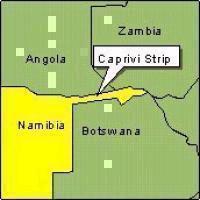







|
News and Information
BETWEEN LEGALITY AND POLITICS: THE CAPRIVI CASE*
| February 25, 2009 |
 BETWEEN LEGALITY AND POLITICS: THE CAPRIVI CASE* BETWEEN LEGALITY AND POLITICS: THE CAPRIVI CASE*
Posted by: nshr on Feb 23, 2009 - 08:58 AM
By: Alexactus T Kaure
IF it doesn’t fit, acquit, said a distinguished African-American lawyer. The late Johnny Cochrane was referring to a glove presented in an LA court as evidence in the O J Simpson murder trial.
A similar observation is likely to force itself upon those concerned with the long-running Caprivi treason case. Almost ten years on and there is no solution in sight. This trial of the remaining 117 men for treason single out Namibia as the only country in the SADC region with political prisoners – not an enviable status! A lot has happened since the arrest of these men back in 1999. Some detainees have died in prison, those wrongfully detained and beaten by the Namibian Police and Army continue to sue the Government (a burden on tax-payers with settlements shrouded in secrecy), and some lawyers in this case died in accidents, some have withdrawn and there have been quarrels over salary issues between local and foreign lawyers.
In a sense, this case has become a milk cow for many lawyers – ten years on a case seems like a sure contract appointment. And indications are that this trial is likely to drag on for sometime to come given Namibia’s spineless and ineffective judicial system – a result of affirmative action and political timidity. Already the trial transcripts are said to be close to 3 000 type-written pages and with lawyers coming and going, that makes it even more difficult for a new lawyer who has to join the case along the way.
One might thus legitimately ask just how many more years and body of evidence is needed to bring this drawn-out case to its logical conclusion – if there is one? What exactly is the punishment for high treason, there being no precedents in Namibia’s legal history?
Shouldn’t we perhaps cast a long gaze beyond the law to argue that this is not a legal but a political problem although it has been ignored in mainstream philosophical and political discourse in Namibia? And that the solution can only be political. I submit here that only President Hifikepunye Pohamba has the key to this case. We must not remain glued to what happened on that fateful day back in 1999 in the Caprivi Region. The nation should look back only as a means of going forward.
This is an election year in which we are also about to celebrate our independence next month. So, this might be an opportune moment for President Pohamba to make that hard decision by granting a pardon to these men who, after all, have spent years in jail without a conviction. This might be an unpopular political decision. But that’s the role of a leader. Such a move could have a significant political meaning in terms of our policy of national reconciliation. It would also help Pohamba put a permanent a mark on the annals of Namibian history.
It took President Barak Obama just few days to make some crucial, if un-popular, decision – approve the stimulus package, put a cap on executive pay and suspended the trial of the Guantanamo Bay prisoners. Pohamba can rightly take that decision since the legal system has completely failed to find a solution and can also take a cue from other secessionist cases in recent history.
This piece is not an argument for or against the Caprivi secession but only to locate the problem within a much broader context of political philosophy. Personally I’m not against a legitimate and peaceable political divorce. There are myriad of reasons why certain groups want separation. There have been successful secessions and not so successful ones in human history. The Biafra in Nigeria, Katanga in Congo failed but Eritrea has been the recent success story in Africa after a protracted struggle. Interestingly, Ethiopia’s new constitution allow for greater autonomy for the regions and even secession. China, for example, has an anti-secession law.
Eastern Europe, especially after the dissolution of the Soviet Union, has been the workshop of secessions. Thus despite our own constitutional niceties and provisions, there are a lot of historical precedents worldwide. Different countries have dealt with issues of secession differently depending on their level of political development and culture.
How to prevent a political divorce is the challenge now facing Namibia and other multi racial/ethnic societies. We can only do that if all accept that Namibia is partly a product of geography, history and accident. We are therefore a nation built on a social and political contract. This in my view is best preserved by consensus democracy rather than the competitive ‘winner-takes-all’ democracy. Don’t let people ask: hi dude, where is my country?
Note: *Source: The Namibian online, February 20 2009
|
Source: www.nshr.org.na |
| http://www.nshr.org.na/modules.php?op=modload&name=News&file=article&sid=1058&mode=thread&order=0&thold=0&POSTNUKESID=fa35ccfe8101e8e287b2894ea029293a |
|
| Support Caprivi Freedom |
Fill out the form below to become a member of this site and receive our regular newsletter.
|

|

